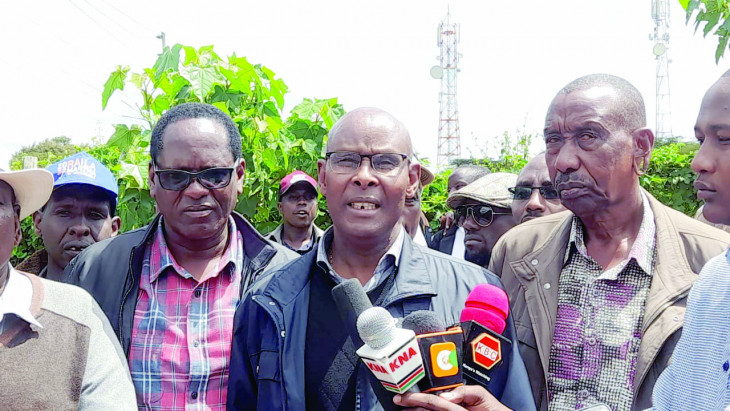Leaders condemn Tanzania for evicting Maasai residents

Maasai leaders in Kenya have joined their northern Tanzania counterparts to protest the eviction of more than 70,000 indigenous residents of Loliondo from their ancestral land by the Tanzania government.
The eviction follows revelations of a plan by the Tanzania government to lease the land to a firm based in the United Arab Emirates (UAE) to create a wildlife corridor for trophy hunting and elite tourism.
Maasai land activists Meitamei Ololdapash and Senator Ledama ole Kina have criticised the move and called for better handling of the plight facing Loliondo Maasai.
“This is a very serious crisis at Olderkesi, on the Kenya side, as we are now hosting groups of refugees from Tanzania. Many of them are missing and might have been attacked by wild animals on their way here,” said Ololdapash after he donated foodstuff to refugees on the Kenya side.
On his Facebook account, Kina condemned the eviction of Tanzania Maasai from their ancestral land, saying: “We must stand together and fight this! We must defend the freedom and liberty of our people. We don’t have a police force in Kenya but a police service. We shall demonstrate peacefully”. However, a request to hold demos in Nairobi at the Tanzania embassy was turned down by police.
A group of lawyers in Kenya have vowed to join their Tanzanian counterparts in filing an urgent case at the International Court of Justice (ICJ) in The Hague to stop the unlawful eviction. Reports indicate hundreds of families are crossing into Kenya to flee the forcible evictions.
In a presser in Narok town, Narok North MP Moitalel ole Kenta led a team of lawyers and the Maasai council of elders to condemn the eviction of pastoralists by Tanzania.
“I will task Maasai lawyers from Kenya to show solidarity with their fellow Maasai in Tanzania and immediately file a case, both in the East Africa Court of Justice in Tanzania and in the ICJ for this unacceptable violation of human rights. We shall seek legal redress and compel the Tanzania Government to respect the rights of over 700,000 pastoralists,” said Kenta.
Accompanied by lawyer Martin ole Kamwaro, Kelena ole Nchoe (council of elder’s chairman), and Narok Woman Rep candidate Lydia Ntimama, the leaders pleaded with President Uhuru to intervene. They told him to request his Tanzania counterpart, Suluhu Hassan, to stop the eviction.
Incredibly important
“I also call upon the international community, the EU and the ICJ to intervene. Their resolution on this matter is important. It is imperative the international community condemns the violation of human rights and intervenes,” said Kenta, who is contesting for the Narok governor seat.
Sources say Tanzania wants to evict Maasais in Ngorongoro conservation — which is designated as a world heritage site by Unesco — and at Loliondo, near Serengeti National Park. Both areas are famous for luxury safari tourism.
Tanzania claims Ngorongoro is overpopulated, to the detriment of wildlife. The government also intends to give exclusive hunting rights in the disputed area to investors from UAE, while 14 villages bordering Serengeti National Park will be evacuated to create a wildlife corridor.
“Near the border with Kenya, over 70,000 Maasai are being forced out of their homes to make way for the ‘luxury game experience’ by Otterlo Business Corporation (OBC), a UAE-owned hunting company. We appeal to this company to call off its operation in this area,” said Kenta.
Otterlo firm is said to be owned by the UAE royal family. Kenta, who is the current Narok MP, argued that if nature conservation is urgent, the indigenous peoples should be part of it as they have coexisted with wildlife and nature for ages.
“The importance of indigenous people is paramount in nature conservation. The wildlife is there because it has coexisted with them amid human-wildlife conflicts. Indigenous people must be involved in finding a solution. Both nature and people should win”, he added in his statement.
Last week, Tanzania authorities started enforcing an order to demarcate a disputed 1,500-square-kilometre wildlife corridor in the Loliondo district of the Arusha region. This is part of a previous plan to create a protected wildlife area and relocate thousands of Maasai herdsmen.
In 2018, the government shelved its plan to evict herders from the disputed wildlife corridor due to international pressure.
Nchoe says the Maasai community was first evicted from Serengeti National Park in 1959, and they have been slowly subjected to harassment, killings and maiming in efforts to push them out of Loliondo.
He said the strip is legally registered in Loliondo division of the Ngorongoro district.











